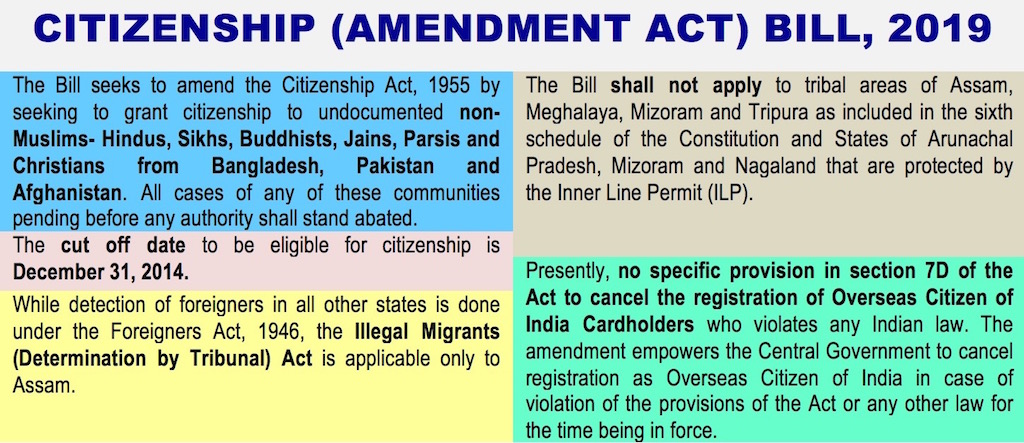| BILL READING: A Bill undergoes three readings in each House, i.e., the Lok Sabha and the Rajya Sabha before it is submitted to the President for assent. |
THE CITIZENSHIP AMENDMENT BILL 2016 TO 2019: BACKGROUND
The Citizenship (Amendment Act) Bill, 2016 was introduced in the Lok Sabha in the last tenure of the present government. It was then referred to a Joint Parliamentary Committee, which submitted its report in January 2019. The Bill was passed in the Lok Sabha but Parliament ended in February 2019 without the proposed law getting Rajya Sabha clearance. The bill after passage will apply to all States and Union Territories of the country and the beneficiaries of Citizenship Amendment Bill will be able to reside in any state of the country. On the basis of recommendations, a fresh bill is introduced namely, the Citizenship (Amendment) Act, 2019.
| The FIRST READING OF BILL refers to: (i) motion for leave to introduce a Bill in the House on the adoption of which the Bill is introduced; or (ii) in the case of a Bill originated in and passed by the other House, the laying on the Table of the House of the Bill, as passed by the other House amounts to ‘First Reading’. |
THE AMENDMENTS & THE IMPLICATIONS
(a) Definition of “Illegal Migrant”
Section 2. (b) of the Citizenship Act, 1955 states that “illegal migrant” means a foreigner who has entered into India―
(i) without a valid passport or other travel documents and such other document or authority as may be prescribed by or under any law in that behalf; or
(ii) with a valid passport or other travel documents and such other document or authority as may be prescribed by or under any law in that behalf but remains therein beyond the permitted period of time;
The amendment seeks to add-
“Provided that persons belonging to minority communities, namely, Hindus, Sikhs, Buddhists, Jains, Parsis and Christians from Afghanistan, Bangladesh and Pakistan, who have been exempted by the Central Government by or under clause (c) of sub-section (2) of section 3 of the Passport (Entry into India) Act, 1920 or from the application of the provisions of the Foreigners Act, 1946 or any order made thereunder, shall not be treated as illegal migrants for the purposes of this Act.”.
Provided further that on and from the date of commencement of the Citizenship (Amendment) Act, 2019, any proceeding pending against any person referred to in the first proviso shall be abated and such person shall be eligible to apply for naturalisation under section 6.”.
The Citizenship Act, 1955 prohibits illegal migrants from acquiring Indian citizenship. The bill amends the Act to provide that the following minority groups will not be treated as illegal migrants: Hindus, Sikhs, Buddhists, Jains, Parsis and Christians from Afghanistan, Bangladesh and Pakistan who reached on or before December 31, 2014. However, to get this benefit, they must have also been exempted from the Foreigners Act, 1946 and the Passport (Entry into India) Act, 1920 by the central government.
(b) Citizenship by naturalisation
III Schedule (d) para: that during the fourteen years immediately preceding the said period of twelve months, he has either resided in India or been in the service of a Government in India, or partly the one and partly the other, for periods amounting in the aggregate to not less than eleven years;
(i) for the 12 months immediately preceding the application for citizenship, and
(ii) for 11 of the 14 years preceding the 12-month period.
‘Provided that for the persons belonging to minority communities, namely, Hindus, Sikhs, Buddhists, Jains, Parsis and Christians from Afghanistan, Bangladesh and Pakistan, the aggregate period of residence or service of a Government in India as required under this clause shall be read as “not less than six years” in place of “not less than eleven years”.’.
(c) Cancellation of registration of Overseas Citizen of India cardholder
Under Section 7D (d) of the Citizenship Act, 1955. An overseas citizen of India (OCI) cardholder’s registration may be cancelled if he violates a law for which he is sentenced to imprisonment of not less than two years within five years of his OCI registration.
“(da) the Overseas Citizen of India Cardholder has violated any of the provisions of this Act or provisions of any other law for the time being in force as may be specified by the Central Government by notification published in the Official Gazette; or”;
This provision also grants the central government-wide discretion to cancel OCI registration for a range of violations. This will include serious offences like murder, as well as minor offences.
THE BIG ISSUE
(i) Whether differentiating on grounds of religion is a violation of Article 14
The Bill provides that illegal migrants belonging to specified religious minority communities from Afghanistan, Bangladesh or Pakistan will not be treated as illegal migrants under the Act, making them eligible for Indian citizenship. These minority communities are Hindus, Sikhs, Buddhists, Jains, Parsis and Christians.
This implies that illegal migrants from these countries who are Muslims, other minorities who do not belong to the above groups will not be eligible for citizenship.
The big question is whether this provision violates the right to equality guaranteed under Article 14 of the Constitution of India because it provides differential treatment to illegal migrants on the basis of their religion.
Article 14 of the Constitution of India guarantees equality to all persons, citizens and foreigners. It only permits laws to differentiate between groups of people if the rationale for doing so serves a reasonable purpose.
In Assam, many groups feel that the bill will nullify the 1985 Assam Accord, which fixed March 24, 1971, as the cut-off date for deportation of all illegal immigrants irrespective of religion. These activists also say that the NRC process was aimed against all illegal immigrants and the CAB will selectively benefit non-Muslim migrants into Assam.
(ii) Cut Off Date
The cut-off date for people to be eligible for citizenship is December 31, 2014. This means they need to have entered India on or before that date. Under the current law, citizenship is given either to people born in India or if they have resided in the country for a minimum of 11 years.
The bill proposes to grant citizenship to those who have stayed in India for six years up to December 31, 2014. The anti-bill voice in the northeast has been wondering what is the historical significance of Dec 31, 2014? In the Assam Accord, the cut-off year was March 24, 1971, whereas in the Manipur People’s (Protection) Bill, passed by the assembly in 2018 and awaiting Presidential nod, the cut off year is 1951.
(iii) Cancellation of OCI registration on minor issues.
The question is whether minor violations should result in cancellation of OCI registration, which may require an OCI who is staying in India to leave the country.
| The THIRD READING OF THE BILL: refers to the discussion on the motion that the Bill or the Bill, as amended, be passed. An almost similar procedure is followed in Rajya Sabha in respect of Bills introduced in that House. After a Bill has been finally passed by the Houses of Parliament, it is submitted to the President for his assent. After a Bill has received the assent of the President, it becomes the law of the land. |
EXCEPTIONS OF THE BILL
There are two exceptions to the bill.
(a) The Bill will not apply to areas under the sixth schedule of the Constitution – which deals with autonomous tribal-dominated regions in Assam, Meghalaya, Tripura and Mizoram.
(b) The bill will also not apply to states that have the inner-line permit regime (Arunachal Pradesh, Nagaland and Mizoram).
These exceptions didn’t exist in the earlier version.
STATEMENT OF OBJECTS AND REASONS AS GIVEN IN THE BILL 2016
The Citizenship Act, 1955 was enacted to provide for the acquisition and determination of Indian citizenship. Under the existing provisions of the Act, persons belonging to the minority communities, such as Hindus, Sikhs, Buddhists, Jains, Parsis and Christians from Afghanistan, Bangladesh and Pakistan, who have either entered into India without valid travel documents or the validity of their documents have expired are regarded as illegal migrants and hence ineligible to apply for Indian citizenship. It is proposed to make them eligible for applying for Indian citizenship.
Many persons of Indian origin including persons belonging to the aforesaid minority communities from the aforesaid countries have been applying for citizenship under section 5 of the Act, but are unable to produce proof of their Indian origin. Hence, they are forced to apply for citizenship by naturalisation under section 6 of the Act, which, inter alia, prescribes twelve years residency as a qualification for naturalisation in terms of the Third Schedule to the Act. This denies them many opportunities and advantages that may accrue only to the citizens of India, even though they are likely to stay in India permanently. It is proposed to amend the Third Schedule to the Act to make applicants belonging to minority communities from the aforesaid countries eligible for citizenship by naturalisation in seven years instead of the existing twelve years.
Presently, there is no specific provision in section 7D of the Act to cancel the registration of Overseas Citizen of India Cardholders who violate any Indian law. It is also proposed to amend the said section 7D, so as to empower the Central Government to cancel registration as Overseas Citizen of India in case of violation of the provisions of the Act or any other law for the time being in force.
The Bill seeks to achieve the above objectives.
CONCLUSION
As per the recorded figures, the refugees from Bangladesh who came into the country numbered about 98 lakh till 1972 as per the opinion published on News 18 website. The Illegal Migrants (Determination by Tribunal) (IMDT) Act, was enacted in Parliament in 1983 by the Indira Gandhi government “for determination of the question whether a person is or is not an illegal migrant”. The IMDT Act described procedures for the detection of illegal immigrants from Bangladesh and deport them from Assam. While detection of foreigners in all other states is done under the Foreigners Act, 1946, the IMDT Act is applicable only to Assam. The religion as the basis of identification of illegal immigrants is a cause of concern.
According to Clause 5 of the Assam Accord, illegal migrants need to be identified and deported. The NRC was based on 1951 Census and the cut-off date adopted was March 24, 1971. According to the accord, migrants who came during 1951-1961 were to be allowed citizenship. Those who came during 1961-1971 were denied voting rights for 10 years after which they are given citizenship. Those who came after March 24, 1971, was to be identified and deported. In December 2018, the first draft NRC was released which threw up at least over 40 lakh illegal migrants. The basis of cut off date too is under debate.
Now the bill awaits the floor test and also need to prove its merit in terms of article 14 of the Constitution for differential identification of illegal migrants on the basis of religion.













Add Comment